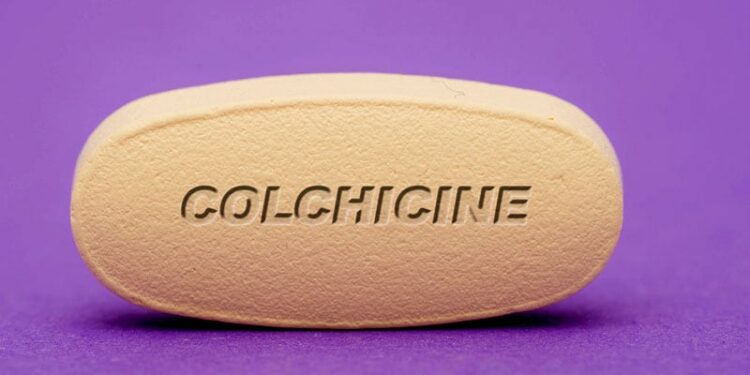TOPLINE:
Gout patients who take colchicine at the start of urate-lowering therapy have a lower risk for cardiovascular events than those who do not receive prophylaxis.
METHODOLOGY:
- Retrospective cohort study of 99,800 patients (mean age, 62.8 years; 74.4% men; 85.1% White) newly diagnosed with gout between January 1997 and March 2021 who initiated urate-lowering therapy.
- Gout flare prophylaxis, defined as a colchicine prescription for 21 days or more, was prescribed to 16,028 patients for a mean duration of 47.3 days at a mean daily dose of 0.97 mg.
- Patients who received colchicine prophylaxis and 83,772 patients who did not receive prophylaxis were followed for a mean of 175.5 and 176.9 days, respectively, in the intention-to-treat analysis.
- The primary outcome was the occurrence of the first cardiovascular event (fatal or nonfatal myocardial infarction or stroke) within 180 days of initiation of urate-lowering therapy.
TAKEAWAY:
- The risk for cardiovascular events was significantly lower with colchicine prophylaxis than without it (weighted hazard ratio [HR], 0.82; 95% CI, 0.69-0.94).
- The risk for a first-ever cardiovascular event was significantly lower with colchicine prophylaxis than without it (adjusted HR, 0.80; 95% CI, 0.62-0.97).
- The findings were similar regardless of analytical approach, and the intention-to-treat analysis did not show an increased risk for diarrhea with colchicine.
IN PRACTICE:
“The findings support consideration for the use of colchicine in people with gout and cardiovascular diseases,” the authors wrote.
“The observed beneficial effect of colchicine concerns a huge group of patients worldwide. In addition, it is conceivable that, if a cardiovascular risk reduction is indeed confirmed, a strong argument arises to recommend the prescription of a course of colchicine to all [flaring] patients with gout, independently of their preference for urate-lowering therapy in general or urate-lowering therapy with or without colchicine prophylaxis more specifically,” experts wrote in a linked commentary.
SOURCE:
Edoardo Cipolletta, MD, Academic Rheumatology, School of Medicine, Nottingham City Hospital, University of Nottingham, Nottingham, United Kingdom, led the study, which was published online on December 18, 2024, in The Lancet Rheumatology.
LIMITATIONS:
Because of the retrospective nature of the data extraction from a prospective database, the study had variations in follow-up and data completeness. Potential surveillance bias could have been introduced because patients with prior cardiovascular events were included in the study, and patients’ adherence to prescribed medications could not be verified.
DISCLOSURES:
This study was funded by the Foundation for Research in Rheumatology. Some authors reported receiving consulting fees, lecturing fees, and travel grants from various pharmaceutical companies and other additional sources.
This article was created using several editorial tools, including AI, as part of the process. Human editors reviewed this content before publication.
Source link : https://www.medscape.com/viewarticle/colchicine-guards-heart-while-fighting-gout-flares-2024a1000pgi?src=rss
Author :
Publish date : 2024-12-31 14:44:06
Copyright for syndicated content belongs to the linked Source.














